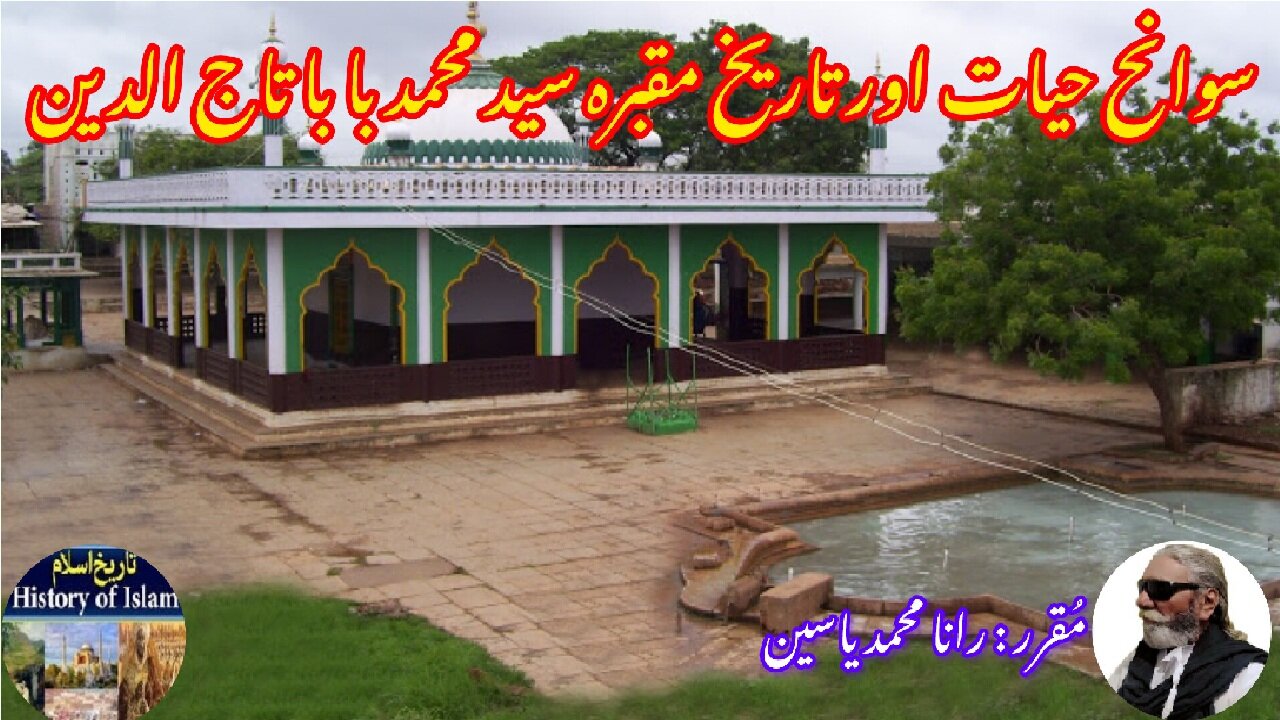Premium Only Content

Syed Mohammad Baba Tajuddin سید محمد بابا تاج الدین کی سوانح حیات اور ان کے مزار کی تاریخ
@islamichistory813 #sufisaint #cultural #heritage #biography #islamic #mysticism #islamic #philosophy #shrine #historical #figures
Biography of Syed Mohammad Baba Tajuddin and the history of his shrine
Dekhti Aankhooon aur sountay kaanoon ko Asslamoalaikum, sisters, brothers friends and elders, in informative series videos of Islamic ascolars, sufisaints, cultural heritages, islamic philosophys, islamic mysticisms and historical figures. today we are describing biography of Syed Mohammad Baba Tajuddin and the history of his shrine.
Syed Mohammad Baba Tajuddin, widely revered as Tajuddin Baba, was a prominent Indian Sufi master, mystic, and spiritual guide who lived during the late 19th and early 20th centuries. Born on January 27, 1861 CE (1277 AH) in the city of Madras (present-day Chennai), India, Baba Tajuddin belonged to a noble and spiritually rich lineage. He is believed by his followers to be a 22nd-generation descendant of Imam Hasan al-Askari, the 11th Shia Imam, and a 10th-generation descendant of the great Sufi master Baha-ud-Din Naqshband Bukhari, founder of the renowned Naqshbandi Sufi order. This esteemed ancestry added to his aura and spiritual credibility in the eyes of his devotees, who later came to revere him with titles such as “Shensha Haft Aqleem,” meaning “Emperor of the Seven Realms.”
Tajuddin Baba’s early life was marked by hardship. He lost both of his parents at a very young age and was raised by relatives. His father had worked as an employee in the British Indian military, and after his passing, Tajuddin Baba was left largely to navigate life on his own. Despite these early challenges, Baba Tajuddin demonstrated an unusual spiritual temperament from a young age. As a child, he exhibited signs of deep introspection, compassion, and detachment from material life—qualities that would later become central to his Sufi teachings.
He completed his early education in a local madrasa, where he became proficient in Arabic, Persian, and Islamic theology. Though he followed conventional Islamic scholarship during his formative years, his destiny lay beyond academic excellence. He was drawn to the path of divine love and spiritual enlightenment. His turning point came when he encountered Hazrat Abdulla Shah, a revered Sufi master in India. After receiving spiritual training and blessings from Shah Sahib, Tajuddin Baba’s life took on a deeper mystical dimension. He renounced worldly attachments and began wandering, absorbed in divine contemplation and service to humanity.
Baba Tajuddin’s fame as a Sufi master grew rapidly due to his spiritual insight, miraculous abilities, and extraordinary wisdom. Thousands of people, regardless of caste, creed, or religion, flocked to seek his blessings and guidance. He was known for curing mental illnesses, offering spiritual solutions to life’s problems, and transforming lives through a single glance or word. His presence in Nagpur, Maharashtra, turned the city into a spiritual hub, and his khanqah (Sufi hospice) became a sanctuary for the poor, the sick, and the seekers of truth.
Despite his increasing popularity, Baba lived a simple life, often dressed in humble clothes and remaining detached from material wealth. His teachings emphasized love for all, submission to God, and inner purification. He inspired not only common people but also kings, soldiers, judges, and politicians who came to him for advice and spiritual support. Baba Tajuddin’s influence extended across religious boundaries, with Hindus, Sikhs, Parsis, and Christians among his followers, reflecting the inclusive essence of Sufism.
Baba Tajuddin passed away on August 17, 1925 CE in Nagpur, where he had spent the majority of his spiritual life. His death was mourned widely, and the impact of his life and teachings continued to echo long after his departure. Following his demise, his followers erected a shrine at the very place where he had resided and spent his final days. The shrine, known as the *Tajabad Dargah* or *Tajuddin Baba Sharif*, is located in Tajabad, Nagpur, and has become a major site of pilgrimage in India.
The construction of the shrine was carried out by his devotees and followers, who wished to preserve his memory and provide a place where future generations could continue to draw inspiration from his life and legacy. Over time, the shrine has grown into a beautiful complex, attracting pilgrims from across the country and abroad. Regular *urs* (death anniversary commemorations), qawwalis, and spiritual gatherings are held at the dargah, keeping the light of Baba’s teachings alive.
The *Tajabad Dargah* remains one of the most visited Sufi shrines in central India, symbolizing peace, healing, and divine grace. It serves not only as a resting place for a great saint but also as a beacon of unity in diversity—an embodiment of Tajuddin Baba’s message of universal love and compassion. His teachings continue to inspire countless people, and his spiritual legacy endures through his shrine, his followers, and the mystical path he illuminated for seekers of truth.
With this, we seek your permission until tomorrow, tomorrow we will describe the biography of Telli Baba and the history of his Shrine.
Allah Hafiz
==============================
-
 6:58
6:58
ISLAMIC HISTORY
20 hours agoBiography of Islamic Scholar Abu Sahl al-Quhi اسلامی اسکالر ابو سہل القحی کی سوانح عمری۔
9 -
 LIVE
LIVE
Chad Prather
10 hours agoWhen God Delays: Trusting Jesus in the Waiting Room of Life
1,426 watching -
 LIVE
LIVE
The Chris Salcedo Show
11 hours agoDems Have Always Been For Giving Your Money To Illegals
597 watching -
 14:41
14:41
IsaacButterfield
1 day ago $1.27 earnedFree Speech Is DEAD In Australia!!
9.96K22 -
 59:59
59:59
SGT Report
10 hours agoIT'S ALL THEATER -- Seth Holehouse
12.5K34 -
 LIVE
LIVE
BEK TV
23 hours agoTrent Loos in the Morning - 10/03/2025
431 watching -
 LIVE
LIVE
The Bubba Army
22 hours agoDiddy BEGS for Mercy in Judge Letter - Bubba the Love Sponge® Show | 10/03/25
2,323 watching -
 LIVE
LIVE
ZENNY
3 hours agoBO7 IS HERE BOT POV MF HAHAHAHA 6v6 PG18+ | UNFILTERED CHAT | CURSES AND BAD
92 watching -
 15:17
15:17
Actual Justice Warrior
2 days agoBLM Leader CONVICTED Of Fraud
15.5K32 -
 13:19
13:19
Zoufry
2 days agoThe Grandpa Gang Who Robbed a Bang For $16 Million
14.4K4
